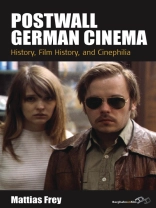Since the fall of the Berlin Wall, there has been a proliferation of German historical films. These productions have earned prestigious awards and succeeded at box offices both at home and abroad, where they count among the most popular German films of all time. Recently, however, the country’s cinematic take on history has seen a significant new development: the radical style, content, and politics of the New German Cinema. With in-depth analyses of the major trends and films, this book represents a comprehensive assessment of the historical film in today’s Germany. Challenging previous paradigms, it takes account of a postwall cinema that complexly engages with various historiographical forms and, above all, with film history itself.
Spis treści
List of Illustrations
Acknowledgements
Introduction
Chapter 1. Rebirth of a Nation: Das Wunder von Bern, the 1950s, and the Reactions to the New German Cinema
Chapter 2. Pop Retro-vision: Baader, Der Baader Meinhof Komplex, and the RAF Film
Chapter 3. The Ambivalent View: 23, Historical Paranoia, and the 1980s
Chapter 4. “Ostalgie, ” Historical Ownership, and Material Authenticity: Good Bye, Lenin! and Das Leben der Anderen
Chapter 5. Unification, Spatial Anxiety, and the Recuperation of Material Culture: Die Unberührbare
Chapter 6. The Future of the German Past
Bibliography
Index
O autorze
Mattias Frey is a Reader in Film Studies at the University of Kent. His research revolves around historical filmmaking, arthouse cinema cultures, film criticism and theory, as well as German and Austrian media. His books include Cine-Ethics: Ethical Dimensions of Film Theory, Practice, and Spectatorship; The Permanent Crisis of Film Criticism: The Anxiety of Authority; Film Criticism in the Digital Age; and Extreme Cinema: The Transgressive Rhetoric of Today’s Art Film Culture.












